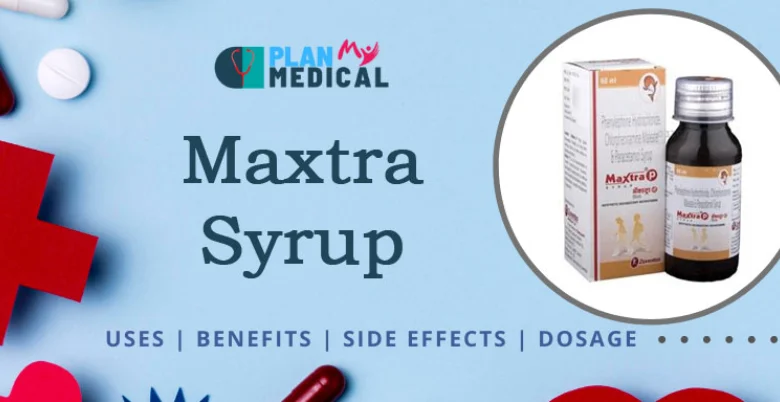A common medication for treating cold and allergy symptoms such nasal congestion, runny nose, and throat discomfort is called Maxtra Syrup.
Active components in it soothe discomfort brought on by these symptoms and assist to reduce inflammation.
The syrup is available for both adults and children, with separate doses recommended for each age group.

However, it is important to note that the use of Maxtra Syrup may also come with some possible side effects, such as drowsiness, nausea, and vomiting.
Read more : Zandu Balm
As a result, it’s crucial to use the syrup according to the dosage and safety instructions.
Overview: Maxtra Syrup
Given below are the maxtra syrup uses you should consider reading. We suggest, consult your doctor while taking any medicine.
Maxtra Syrup Uses:
- Maxtra Syrup is used to provide relief from a range of common colds, coughs, and allergy symptoms.
- It is particularly effective in treating nasal congestion, runny nose, and throat irritation.
- The syrup contains active ingredients such as Phenylephrine, Chlorpheniramine, and Paracetamol, which work together to alleviate these symptoms.
- Phenylephrine helps to constrict blood vessels in the nasal passages, reducing congestion.
- Chlorpheniramine helps to alleviate symptoms such as runny nose and sneezing, while Paracetamol acts as a pain reliever and fever reducer.
Maxtra Syrup Cost in India
Maxtra syrup in size 60 ml is available at INR 96 in India.

Benefits and Side-effects of Maxtra Syrup
Maxtra Syrup can help with a variety of cold and allergy symptoms, such as throat irritation, nasal congestion, and runny nose.

The active ingredients in the syrup, such as Phenylephrine, Chlorpheniramine, and Paracetamol, work together to alleviate these symptoms.
The syrup can also help to reduce fever and pain associated with colds and allergies.
Maxtra Side Effects
Like any medication, Maxtra Syrup can have potential side effects. The syrup’s most frequent side effects are drowsiness, nausea, and vomiting.
Read also : Combiflam Syrup
The less frequent side effects may also include headache, blurred vision, and dry mouth.
Precautions while taking Maxtra Syrup:
Before taking Maxtra Syrup, it is important to inform your healthcare professional if you have any allergies or medical conditions.
People with high blood pressure, heart disease, thyroid problems, or diabetes should avoid using the syrup or take it under medical supervision.
It is also important to follow the recommended dosage and administration guidelines provided by your healthcare professional or the packaging label.
Overdose or misuse of the syrup can lead to severe side effects.
Women who are expecting or nursing should refrain from using the syrup without first visiting a doctor.
Read also about : Betnovate C Cream
Before using Maxtra Syrup, it is advised to let your healthcare provider know if you are taking any other drugs because the syrup may interfere with them.
The active ingredients in Maxtra Syrup are Phenylephrine, Chlorpheniramine, and Paracetamol.
Each of these components has a function in the management of cold and allergy symptoms:
A decongestant, phenylephrine helps to constrict blood vessels in the nasal passages, reducing congestion and assisting in the relief of nasal congestion symptoms.
Chlorpheniramine is an antihistamine that helps to block the effects of histamine, which is produced by the body in response to an allergen.
Histamine can cause symptoms such as runny nose, sneezing, and itching. By blocking the effects of histamine, Chlorpheniramine helps to alleviate these symptoms.
Read more : Levomac 750 Tablet
Paracetamol is a pain reliever and fever reducer that helps to alleviate symptoms such as fever, headache, and body aches associated with colds and allergies.
The other ingredients in Maxtra Syrup include:
- Sodium benzoate and Sodium citrate: These are preservatives that help to prolong the shelf life of the syrup.
- Propylene glycol: This is a solvent that helps to dissolve the active ingredients and make the syrup more palatable.
- Sucrose: This is a sweetener that improves the taste of the syrup.
- Water: This is the base of the syrup that helps to dissolve the ingredients and make the syrup a liquid form that is easier to administer.
It is important to note that individuals with diabetes or those who are on a low-sugar diet should be aware that Maxtra Syrup contains sucrose, which is a type of sugar.
Substitutes for Maxtra Syrup:

- Claritin (Loratadine) – This is an antihistamine that can help relieve symptoms such as runny nose, sneezing, and itching. It is non-drowsy and does not cause as much drowsiness as some other antihistamines.
- Sudafed (Pseudoephedrine) -This decongestant can help with symptoms including sinus pressure and nasal congestion. It can be bought as an oral medication or a nasal spray.
- Tylenol (Acetaminophen) – This is a pain reliever and fever reducer that can help relieve symptoms such as fever, headache, and body aches associated with colds and allergies.
- Mucinex (Guaifenesin) – This is an expectorant that can help relieve symptoms such as chest congestion and cough by thinning and loosening mucus in the airways.
Safety Advice for Maxtra Syrup

- Dosage Guidelines – The dosage of Maxtra Syrup may vary depending on the age and weight of the person. It is important to consult a healthcare professional before giving the syrup to babies and kids. Adults should not exceed the recommended dose.
- Allergies or Medical Conditions – If you have any known allergies or medical conditions, it is important to inform your healthcare professional before using Maxtra Syrup. Individuals with high blood pressure, heart disease, diabetes, liver or kidney disease, or glaucoma should consult a doctor before using this medication.
- Possible Drug Interactions – Other medications, including prescription and non-prescription pharmaceuticals, herbal supplements, and vitamins, may interact with Maxtra Syrup. Before using Maxtra Syrup, it is crucial to let your doctor know about all the medications you are presently taking.
Read also about : Althrocin 250 Tablet
- Contraindications – Maxtra Syrup is contraindicated in individuals who are hypersensitive to any of the ingredients in the syrup, and in individuals who have taken a monoamine oxidase inhibitor (MAOI) within the last 14 days.
- Storage – Maxtra Syrup should be kept out of reach of children, at room temperature, and away from moisture and heat.
- Side Effects – Maxtra Syrup’s typical adverse effects include drowsiness, nausea, and vomiting. It’s crucial to contact a healthcare provider right away if you encounter any severe or lingering adverse effects.
You may also like to read – Ivermectol 6mg Tablet
- Duration of Use – Maxtra Syrup should not be used for more than 5-7 days without consulting a healthcare professional. Prolonged use may lead to serious side effects.
Maxtra Syrup Fact Box
Brand Name: Maxtra Syrup
Manufacturer: Mankind Pharma Limited
You may also like to read – Aceflam P Tablet
Active Ingredients: Phenylephrine Hydrochloride, Chlorpheniramine Maleate, and Paracetamol
Indications: For the treatment of cold, allergy, and upper respiratory infection symptoms such as runny nose, nasal congestion, sore throat, and fever.
Dosage: Dosage is affected by a person’s weight and age. Carefully adhere to the dose recommendations.
Here you can also check the – Abevia N Tablet
Expiration Date: Check the label for the expiration date.
Emergency Contact: In case of emergency or adverse reactions, contact a healthcare professional or local emergency services immediately.
